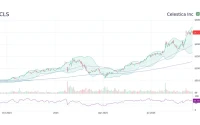So, Morgan Stanley just put out a big, scary report. The headline takeaway: Morgan Stanley warns AI stock boom is running out of steam. The fireworks show, they say, is "petering out." The financial wizards at one of the world's most powerful banks, the same ones who happily sold tickets to this circus, are now standing by the exit, pointing to the storm clouds they just noticed.
And I'm supposed to be grateful for the warning?
Give me a break. I’m not panicked. I’m pissed. This isn't a public service announcement. It's the sound of the house changing the rules in the middle of a hand. For three years, AI has been the "one-note narrative," a magical money printer that accounted for 75% of S&P 500 returns. We all watched as the market became dangerously addicted to a single theme, and not a peep from the big banks except "buy more." Now, with the S&P’s AI index lagging the broader market this year, they’re suddenly concerned about our portfolios?
This isn’t a warning. It’s a beautifully timed, perfectly executed "we told you so" in advance. It’s the institutional equivalent of a stagehand whispering that the main actor is about to forget his lines, right after selling you a front-row seat.
The "Seventh Inning" of a Rigged Game
Lisa Shalett, the chief investment officer at Morgan Stanley Wealth Management, says we’re in the "seventh inning" of the AI boom. It's a cute, folksy metaphor. But let's be real. This isn't a baseball game; it was never a fair contest. It's more like the eighth sequel in a bloated movie franchise. The first one was revolutionary, but now the plot is thin, the CGI is carrying all the weight, and the studio is just milking it for every last dime before the audience finally gets sick of it.
And the big banks were the executive producers, hyping it the whole way.
They point to hyperscalers' free cash flow turning negative and "speculative" deal-making as the big red flags. You don't say. You mean the strategy of "spend billions now, figure out profitability later" has a downside? Who could have possibly seen that coming, other than anyone with a functioning brain and a memory that goes back to the dot-com bust?
The real question isn't whether the boom is slowing. Offcourse it is; nothing grows to the sky. The question is, why is Morgan Stanley ringing the alarm bell now? Are they trying to trigger a sell-off so their high-net-worth clients can swoop in and buy the dip? Or are they just building a paper trail to show regulators when the whole thing inevitably wobbles?

"Shifting Gears" Is Just PR for "The Easy Money's Gone"
The corporate-speak apologists are already out in force. One expert quoted says AI spending isn't falling, it's just "shifting gears" from a sprint to a marathon. That sounds nice, doesn't it? It sounds strategic and mature.
Here’s the Nate Ryder translation: The VCs have turned off the firehose of cash, and now all those "visionary" AI startups have to actually, you know, make money. This is a bad situation. No, "bad" doesn't cover it—this is a five-alarm dumpster fire for any company that doesn't have a direct line to a tech giant's checkbook.
The "marathon" means the big players with cash and contracts will be fine. They'll keep investing. But the smaller firms without steady cash flow, access to the insane amount of power these models need, or a real product? They're about to get wiped off the map. This isn't a "shift." It's a culling. And they expect the retail investor—the teacher, the plumber, the kid who put his savings into some hot AI stock—to just sit there and take it while the institutions pivot...
And what are they pivoting to? The advice from Morgan Stanley is a masterclass in cynical boilerplate. "Sell small-cap, unprofitable tech." You mean the exact stocks the hype cycle pushed on everyone for the last 24 months? They also suggest being "highly selective in consumer names" because, I guess, people might stop buying things when their stock portfolio evaporates. Groundbreaking stuff.
But the real kicker is the advice to buy "real assets." Gold. REITs. Energy infrastructure. Agricultural commodities. It’s like they’re telling us to flee the futuristic world of AI they just built and go back to a 1970s investment strategy. It feels less like sage advice and more like a panic move. My uncle used to bury coffee cans full of silver dollars in his backyard; is that what `morgan stanley wealth management` is going to recommend next? It's all so tiresome. I get the same pitches from `Fidelity` and `JP Morgan` in my inbox every week, just with a different logo.
Then again, maybe I'm the crazy one. Maybe these people really are financial geniuses who can see the future. But my gut tells me that when the wizards who built the magic castle start telling everyone to buy bricks and timber, it’s because they know the whole glittering thing is about to turn back into a pumpkin.
The Casino Is Just Changing the Table Minimums
Let's be perfectly clear about what's happening here. This isn't Morgan Stanley looking out for the little guy. This is the casino manager announcing over the loudspeaker that the $5 blackjack tables are closing. The game isn't over. It's just getting more exclusive. The easy, speculative phase that let everyone feel like a genius is ending, and the "marathon" phase—where only the biggest players with the deepest pockets can afford to stay in—is beginning.
They're not ringing an alarm bell. They're ringing a dinner bell for themselves. The market will dip, they'll buy up the quality names for cheap, and the retail investors who got in at the top will be left holding the bag. It's the oldest story on Wall Street, just dressed up in the shiny new clothes of generative AI. And that, right there, is why I'm pissed. It's not the fall that gets you; it's the hypocrisy on the way down.









